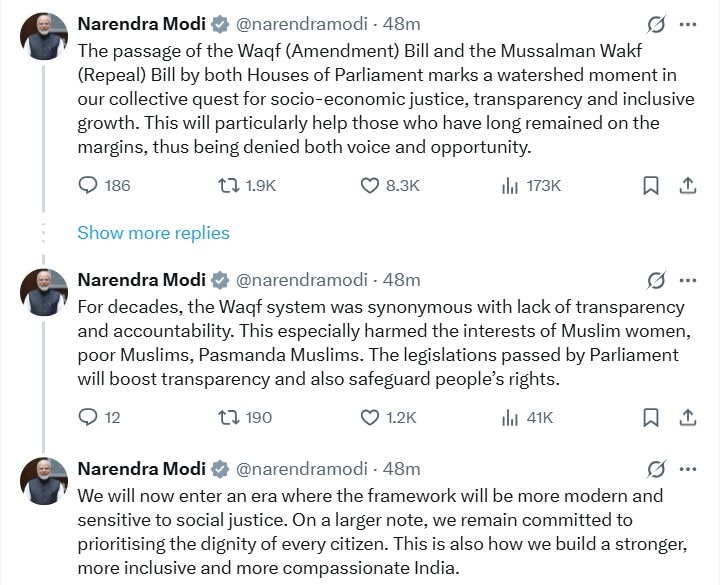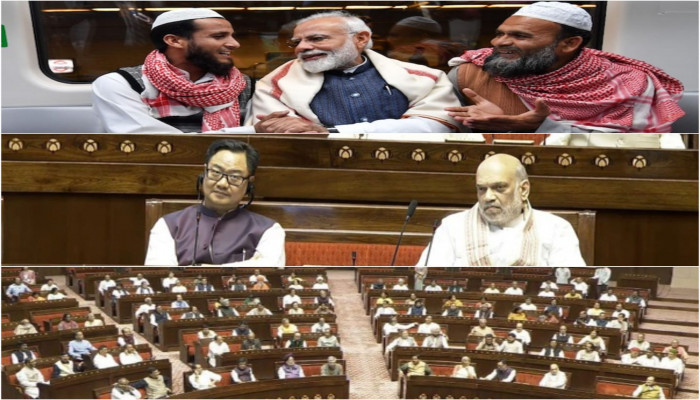Waqf Bill passes both houses of Parliament as opposition falters, clears Rajya Sabha with 128-95 vote
- In Current Affairs
- 01:53 PM, Apr 04, 2025
- Myind Staff
The Waqf Bill quickly cleared both houses of Parliament, passing the Rajya Sabha just a day after its smooth approval in the Lok Sabha, following an intense and lengthy debate. The process revealed internal weaknesses among the parties opposing the bill. In the final count, 128 members voted in support, while 95 voted against it.
Just hours before the vote, Naveen Patnaik's Biju Janata Dal announced a "conscience vote," allowing its seven Rajya Sabha MPs to vote freely without being bound by a party whip. Senior leader Sasmit Patra explained in a post on X that the decision was made after considering the sentiments of “different sections of the Minority communities regarding the Waqf (Amendment) Bill.”
As expected, the arguments during the debate followed predictable lines. Minority Affairs Minister Kiren Rijiju, who initiated the discussion, rejected claims that the proposed bill would negatively affect Muslims. He clarified that the Waqf Board’s formation, operations, and benefits would remain reserved exclusively for Muslims and non-Muslims would not have any say in its matters. Rijiju stressed that the bill is focused on property and its governance, not religion, and is intended to tackle corruption.
A significant change, he explained, is that ownership documents will now be mandatory before any property can be declared as Waqf. This change removes the earlier system where the Waqf Board’s claim alone was enough to label land as Waqf property. He and Union Minister Amit Shah had also pointed out several notable examples of properties previously marked as Waqf, including land in Delhi’s Lutyens zone, a centuries-old temple in Tamil Nadu, land allocated for a luxury hotel, and even the former Parliament building.
Congress leader Syed Naseer Hussain replied to Mr Rijiju, "They are creating confusion about 123 properties. They are either Masjids, burial grounds or dargahs."
He further added, "I want to submit a list of those. When the British occupied Lutyens' Delhi, these properties were handed over to the Waqf by them after the construction of the area. These properties are with the Waqf. These were the ones that are being referred to by them in relation to 2013." During the discussion, Hussain and Amit Shah also had a heated exchange. Hussain challenged the BJP's claim that under the existing Waqf Act, people cannot approach the court if they disagree with the Tribunal’s decision. "This is false. How are there so many pending cases in the High Court and Supreme Court if none could move court?" he asked.
In response, Shah argued, "They (the Congress) did not keep a provision for a civil suit, which has a wide purview, in the court in the 2013 Act. They only have a provision for writ jurisdiction in the High Court, which has a very limited purview."
Supporting the bill, Union Minister JP Nadda criticised the Opposition for trying to distract from the main issue. He emphasised the need to focus on the underprivileged sections of the Muslim community. Nadda also questioned why India should not implement reforms when several Muslim nations have made Waqf properties more transparent and introduced a digitised system.
Congress leader Mallikarjun Kharge urged the government not to treat the bill as a matter of prestige, warning that it could create conflicts in the country. “What you (government) are doing is not good. This will lead to disputes in the country. You are sowing seeds for disputes... I appeal to the Home Minister to withdraw this. What is the harm in rectifying the errors?” he said.
Presenting what he described as a "comparative statement," Kharge pointed out that the bill was passed in the Lok Sabha with 288 votes in favour and 232 against. “Did everyone accept it? This means that there are drawbacks (in the Bill). You should see this... If you go by 'jiski laathi uski bhains', this will not be good for anyone,” he notified the House.
Criticising specific provisions, he questioned the requirement of two non-Muslims on the Waqf Board. “Why two non-Muslims are required (to be part of Waqf board)? In Tirupati, do you keep any Muslims? Are there Muslim members in the Ram Temple Trust? Let alone Muslims, you won't put a Dalit Hindu like me also there.”
His remarks echoed those of AIMIM leader Imtiaz Jaleel, who also raised concerns about the provision. “If non-Muslims are going to be appointed on the Waqf Board, are they going to include Imtiaz Jaleel in Shirdi Saibaba (temple) trust or Tirupati temple trust? If such a board comes up for the Sikh community, no non-Sikh can be appointed. So, why such things are for the Waqf Board only,” he questioned.
In a late-night session, the Lok Sabha passed the bill with a 288-232 vote after more than 12 hours of debate. The bill, awaiting the President’s approval, seeks to amend the 1995 law regulating Waqf properties. A key point of contention in the proposed amendments is the requirement to include at least two non-Muslim members in the Central Waqf Council and Waqf Boards.
The proposed law includes a condition that only individuals who have practised Islam for at least five years can donate property to Waqf. The Opposition has questioned how the government plans to verify a person’s religious practice and has argued that restricting converts from making donations violates fundamental rights, including religious freedom and equality.
According to the bill, government-owned properties designated as Waqf will no longer belong to the state, with ownership being determined by the local Collector. Additionally, an officer above the Collector’s rank will investigate government properties claimed as Waqf. In disputes, a senior government official will have the final authority to decide whether a property belongs to Waqf or remains government-owned, replacing the current system where Waqf tribunals decide such matters.
The Opposition and some Muslim community members see this as an attempt by the government to assert control over Waqf properties.
Meanwhile, Prime Minister Narendra Modi described the passage of the Waqf Amendment Bill in Parliament as a "watershed moment", stating that it would empower marginalised sections of the Muslim community and enhance transparency in the administration of Waqf properties. The bill, which grants the government a more significant role in overseeing Waqf assets, was approved by both Houses after extensive debates that continued late into the night over two consecutive days.
"The passage of the Waqf (Amendment) Bill by both Houses of Parliament marks a watershed moment in our collective quest for socio-economic justice, transparency and inclusive growth. This will particularly help those who have long remained on the margins, thus being denied both voice and opportunity," Prime Minister Modi, currently in Thailand for the BIMSTEC Summit, shared in a tweet.








Comments